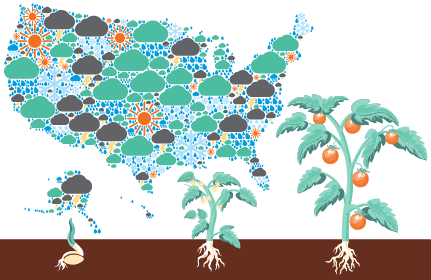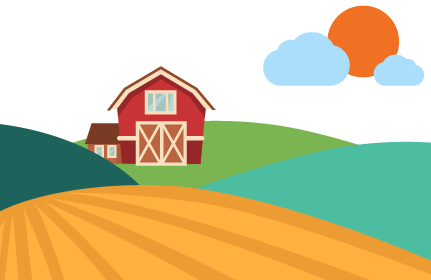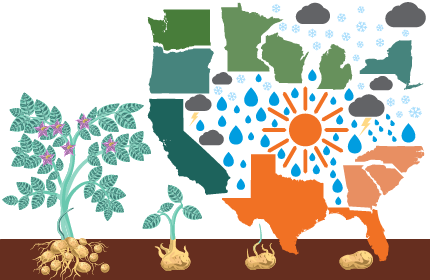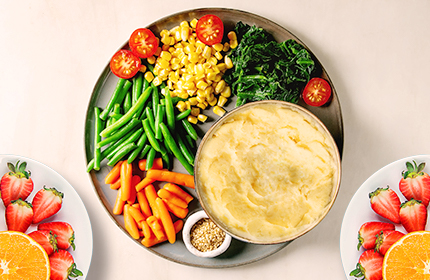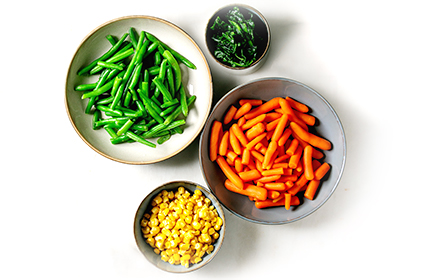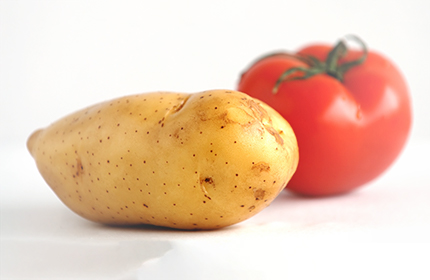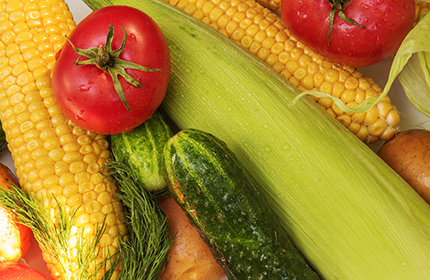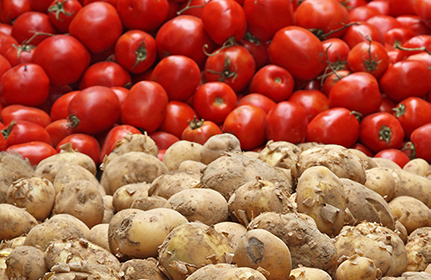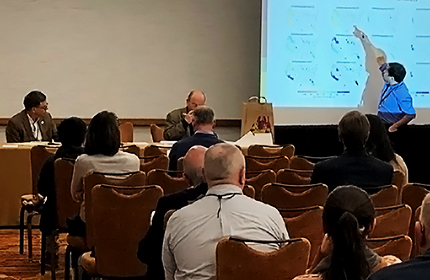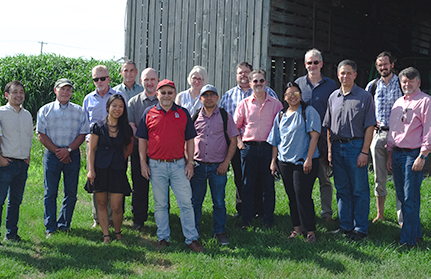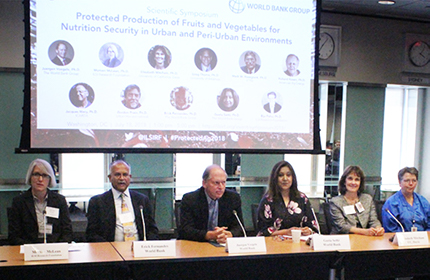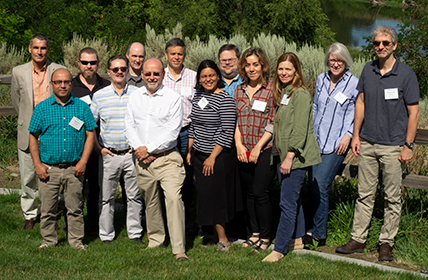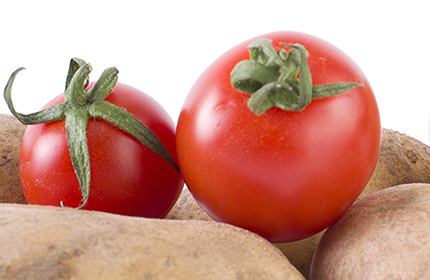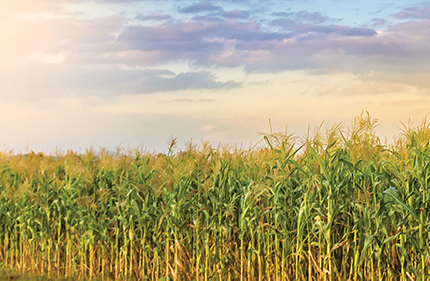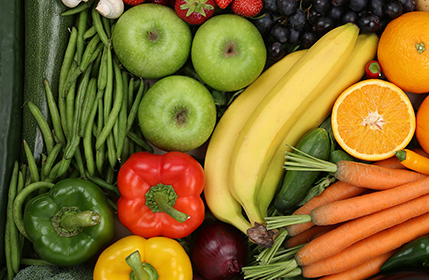Overview
Americans are encouraged to eat more fruits and vegetables as part of a healthy, balanced diet. However, meeting increased demand for these highly nutritious foods will be challenging for domestic production regions in the United States. Supply chains are undergoing significant innovation and transformation as a result of multiple drivers including:
- Consumer preference for fresh, locally grown produce
- Climate change and increased competition for natural resources
- Cost and availability of labor
- Efforts to improve sustainability profiles
- The rise of protected and peri-urban production
Collaborators & Partners
- University of Florida (UF)
- International Food Policy Research Institute (IFPRI)
- University of Arkansas (UARK)
- University of Illinois at Urbana-Champaign (UIUC)
- World Agricultural Economic and Environmental Services (WAEES)
- Washington State University (WSU)
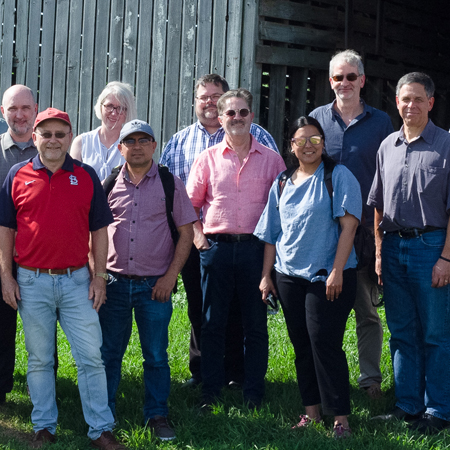
Crops
- potatoes
- tomatoes
- sweet corn
- green beans
- carrots
- spinach
- strawberries
- oranges
What We Did
The Agriculture & Food Systems Institute and the University of Florida jointly managed an integrated, transdisciplinary team of scientists, extension specialists, practitioners, and students from several institutions. The project “Fruit and Vegetable Supply Chains: Climate Adaptation and Mitigation Opportunities” was funded by a $3 million, four-year grant from the United States Department of Agriculture National Institute of Food and Agriculture (USDA NIFA), awarded in 2017.
Goal
Through the development of novel integrated modeling methods, the project sought to identify and test adaptation and mitigation opportunities for fruit and vegetable crops, with the overarching goal of enhancing the productivity, resilience, and sustainability of domestic produce supply chains.
Crop, economic, environmental, and life cycle assessment modeling were used to determine current and future climate and water availability impacts on yield, quality, price, and environmental profile of selected fruit and vegetable crops.
Outcomes
The project’s outcomes are summarized in research articles published in The International Journal of Life Cycle Assessment and Nature Food. Web tools showcasing different visualizations of the project’s modeling results were also developed by Washington State University and the University of Florida. The Agriculture & Food Systems Institute is part of an ongoing extension-based project based on these results, funded by the USDA National Institute of Food and Agriculture in 2023, which aims to create a train-the-trainer program to educate extension agents and specialists focused on fruit and vegetable systems.
Crop Modeling
UF, WSU, and UIUC examined current and future climate and water availability impacts on yield and quality of selected fruit and vegetable crops.
Economic Modeling
IFPRI and WAEES looked at current and future prices and production costs of selected fruit and vegetable crops, with a focus on California, the Pacific Northwest, and Southeast.
Life Cycle
Assessment Modeling
UARK identified and evaluated cost-effective adaptation and mitigation opportunities.
Accountability
AFSI, UF, and WSU engaged with stakeholders and decision makers to ensure models reflect realistic practices, and that the results provide useful, actionable information.
Media Coverage
Scientists Lead New Efforts to Enhance Sustainability of Produce Supply Chains
USDA Announces More Than $8 Million to Address Shifting Environmental Conditions and Impact on Agriculture
USDA Announces More Than $8 Million to Address Shifting Environmental Conditions and Impact on Agriculture
With $3 Million Grant, Researchers Hope to Help Find Sites to Grow Tomorrow’s Produce
Agriculture & Food Systems Institute Co-Leads New Effort to Improve US Fruit & Vegetable Supply Chains
With $3 Million Grant, Researchers Hope to Help Find Sites to Grow Tomorrow’s Produce
Researchers Hope to Help Find Sites to Grow Tomorrow’s Produce
USDA Announces More Than $8 Million to Address Shifting Environmental Conditions and Impact on Agriculture
With $3 Million Grant, Researchers Hope to Help Find Sites to Grow Tomorrow’s Produce
Researchers On a Mission to Find More Places for Growing Produce
Researchers Seek Sites for Tomorrow’s Produce
Florida Researchers Seek Production Options
University of Florida Looks for More Places to Grow Produce
USDA Issues $3m Grant to Find More Places for Growing Produce
Agriculture & Food Systems Institute Co-Leads New Effort to Improve US Fruit and Vegetable Supply Chains
Research Team Explores Impact of Climate Change on Future of Fresh Fruits and Vegetables
Project Publications
Climate Analogs Can Catalyze Cross‐Regional Dialogs for US Specialty Crop Adaptation
In Pursuit of More Fruitful Food Systems
Supply Chains for Processed Potato and Tomato Products in the United States Will Have Enhanced Resilience with Planting Adaptation Strategies
Mitigating Sustainability Tradeoffs as Global Fruit and Vegetable Systems Expand to Meet Dietary Recommendations
Protocol for Life Cycle Assessment Modeling of US Fruit and Vegetable Supply Chains: Cases of Processed Potato and Tomato Products
Cradle to Grave Environmental Impact Evaluation of the Consumption of Potato and Tomato
Towards a Multiscale Crop Modeling Framework for Climate Change Adaptation Assessment
Excessive Rainfall Leads to Maize Yield Loss of a Comparable Magnitude to Extreme Drought in the United States
Toward Building a Transparent Statistical Model for Improving Crop Yield Prediction: Modeling Rainfed Corn in the U.S.
A SIMPLE Crop Model
Environmental Sustainability of Fruit and Vegetable Production Supply Chains in the Face of Climate Change: A Review
Protocol for US Fruit and Vegetable Crop Modeling
Discover
Publications
Climate Analogs Can Catalyze Cross‐Regional Dialogs for US Specialty Crop Adaptation
Scientific Reports | June 8, 2023
Communication theory suggests that interactive dialog rather than information transmission is necessary for climate change action, especially for complex systems like agriculture. A pilot dialog of target‐analog pairs showed promise in eliciting actionable adaptation insights, indicating potential value in incorporating analog‐driven dialogs more broadly in climate change communication.
In Pursuit of More Fruitful Food Systems
The International Journal of Life Cycle Assessment | October 4, 2022
Recent analyses suggest that global fruit and vegetable (F&V) production will need to increase by 50–150% by 2050 to achieve sustainable and healthy diets for all 10 billion people expected to inhabit the world. We have just completed a 5-year project that began to tackle this daunting challenge: fruit and vegetable supply chains: climate adaptation and mitigation opportunities.
Supply Chains for Processed Potato and Tomato Products in the United States Will Have Enhanced Resilience with Planting Adaptation Strategies
Nature Food | October 18, 2021
Food systems are increasingly challenged to meet growing demand for specialty crops due to the effects of climate change and increased competition for resources. In this paper, researchers apply an integrated methodology that includes climate, crop, economic and life cycle assessment models to US potato and tomato supply chains.
Mitigating Sustainability Tradeoffs as Global Fruit and Vegetable Systems Expand to Meet Dietary Recommendations
Environmental Research Letters | May 4, 2021
This paper examines three examples of important F&V—avocados, leafy greens, and tomatoes—to assess the global challenge of meeting dietary recommendations at affordable prices to consumers while sustaining producer livelihoods and minimizing environmental damage.
Towards a Multiscale Crop Modelling Framework for Climate Change Adaptation Assessment
Nature Plants | April 15, 2020
An advanced multiscale crop modelling framework will enable a gene-to-farm design of resilient and sustainable crop production systems under a changing climate at regional-to-global scales.
Protocol for US Fruit and Vegetable Crop Modeling
October 1, 2018
The goal of this protocol is to assess the climate change impact on fruit and vegetable production and potential adaptations, including possible shifts in production area in the United States.
Assessing Sustainable Nutrition Security: The Role of Food Systems
June 1, 2014
This working paper explores the key domains of sustainable nutrition security (SNS).
Events
-
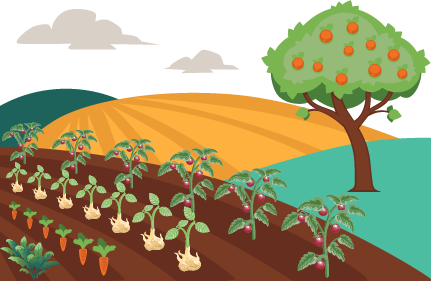 US Fruit & Vegetable Supply Chains: Climate Adaptation & Mitigation Opportunities
US Fruit & Vegetable Supply Chains: Climate Adaptation & Mitigation OpportunitiesMarch 8, 2022-March 22, 2022
Washington, DC, USA
-
 Extension Dialogues on Climate Change and Analogs of US Specialty Crop Production
Extension Dialogues on Climate Change and Analogs of US Specialty Crop ProductionMarch 1, 2022-March 31, 2022
Pullman, WA, USA
-
 Climate Adaptation & Mitigation in Fruit & Vegetable Supply Chains Project Advisory Committee Meeting
Climate Adaptation & Mitigation in Fruit & Vegetable Supply Chains Project Advisory Committee MeetingFebruary 1, 2022
Washington, DC, USA
-
 Preparatory Webinars for the Extension Dialogues on Climate Change and Analogs of US Specialty Crop Production
Preparatory Webinars for the Extension Dialogues on Climate Change and Analogs of US Specialty Crop ProductionJanuary 14, 2022-January 21, 2022
Pullman, WA, USA


